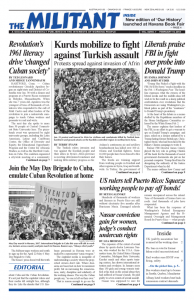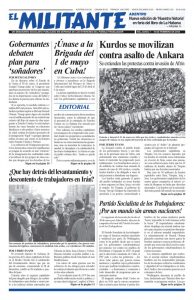Hundreds of thousands of workers and farmers in Puerto Rico are still without electricity five months after Hurricane Maria. Damaged schools remain unrepaired across the island. Tens of thousands of homes have no roofs. And thousands of jobs have evaporated.
What has been the response of Washington’s Federal Emergency Management Agency and the Financial Oversight and Management Board for Puerto Rico — what people in Puerto Rico call the junta? The board was given dictatorial power over the U.S. colony’s finances by the U.S. Congress in 2016 to maximize payment on the island’s $74 billion debt.
An immediate increase in aid and urgent measures to repair the damage? Cut the people of Puerto Rico a break?
Not a chance. FEMA announced Jan. 29 that everything had improved and it was ending its already too-meager food and water distribution. Two days later, after an outcry of criticism, agency leaders backed off, saying it was all a misunderstanding.
Half the population of the island lives in what is called “informal” housing — homes they’ve built themselves with help from family and friends with no legal title. More than 13,000 families have been denied FEMA reconstruction aid, largely with this as the excuse.
And the oversight board? On Jan. 31 board Chairman José Carrión said that despite the “radically changed” reality, serious “structural reforms” — that is, finance payback to bondholders on the backs of working people — must move ahead.
His demands? “A real labor reform that permits us to compete effectively”; “tax reform that encourages investment”; and “‘welfare to work reform.”
Translation: Keep cutting wages, pensions and benefits and laying off government workers; cut taxes for the employers; and force people on food stamps to work somewhere, no matter the wage, or lose their benefits.
“These have to be adopted now!” Carrión demanded. “So that our economy grows again, generates more wealth and YES, allows us to pay a fair, reasonable and sustainable part of the debt that we have to our creditors.”
“But the vulture funds have already recovered their investment many times over,” Luis Aristud, an insurance adjuster and president of the Association of Sports Fishermen in Canóvanas, told the Militant by phone Feb. 2, referring to the speculators and bondholders who hold the debt.
“Really,” he said, “what everybody here would like is to cancel the debt.”
Washington pushes privatization
Taking advantage of widespread resentment over the bureaucratic mismanagement by the bosses at the state-owned Puerto Rico Electric Power Authority, the junta is pushing proposals to privatize and sell it.
The hurricane came on top of the economic and social devastation that has ravaged the island and intensified since 2007 as a result of the worldwide capitalist economic crisis and the anti-working-class measures taken by Washington and the colonial regime.
To pay the debt, the Power Authority stopped modernizing its equipment and electrical grid, laid off union workers and cut back on maintenance. Fox News reported Feb. 1 that while most electric companies use three to four different transformers in their network, Puerto Rico’s ancient system uses more than 200. The hurricane was the straw that broke the camel’s back.
After the storm the U.S. Army Corps of Engineers and FEMA took control of coordinating efforts by the Power Authority, U.S. electric companies and private contractors to restore power. The Army Corps and Power Authority bosses have traded accusations as to which one bears the most responsibility for the disastrous lack of progress.
“The big fish eats the little fish,” Rev. Rufino Carrión said by phone from Gurabo, Puerto Rico, Feb. 3. While U.S. officials and bureaucrats at the Power Authority squabble, “it’s the working class, the poor class, that is suffering the abuse.”
Carrión organized a protest in Gurabo in early January demanding electricity. He said he knew about the Cuban government’s offer to send brigades of electricians to help, which was cavalierly refused by Washington and the government of Puerto Rico. Aid has also been offered from Mexico and other neighboring nations. “Let them come from wherever, it’s no problem,” said Carrión. “If Mexico, if communist Cuba, whoever, want to help they should be allowed to do it.”
More than 50 supporters of independence for Puerto Rico protested Feb. 1 in front of the meeting of the junta in New York’s Wall Street district. “Struggle yes, surrender no!” they chanted in Spanish.
Selling the electric company to U.S. capitalists would just deepen the web of colonial exploitation and oppression of the people of Puerto Rico, Lorraine Liriano, a spokesperson for Call to Action on Puerto Rico, told participants.
“Puerto Rico is not just an issue for Puerto Ricans,” she added. “We face the same questions in the U.S.”

